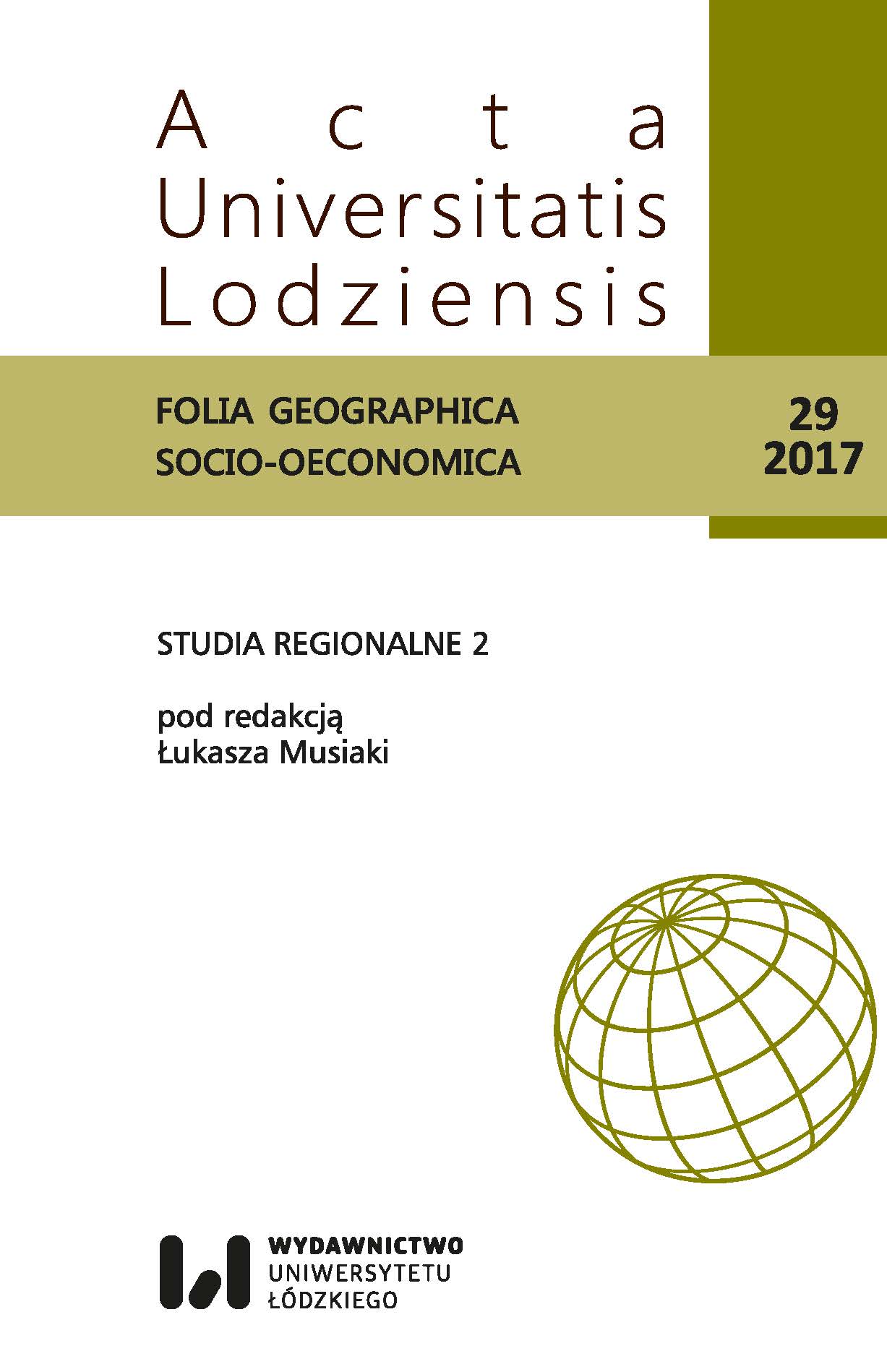Usługi gastronomiczne: organizacja przestrzenna i miejsce w geografii człowieka (przykład Obwodu Kijowskiego)
DOI:
https://doi.org/10.18778/1508-1117.29.05Słowa kluczowe:
usługi gastronomiczne, organizacja przestrzenna, rozwój miasta, KijówAbstrakt
Prezentowany artykuł ma na celu opisanie najważniejszych cech sektora usług restauracyjnych i jego organizacji terytorialnej w okręgu kijowskim. Gastronomia może być postrzegana jako część ekonomiki, która w ciągu ostatnich dziesięcioleci notuje dynamiczny rozwój, przyczyniając się do wzrostu gospodarczego i zapewniając miejsca pracy. Stanowi także istotną część infrastruktury turystycznej i przestrzeni publicznej, ułatwia komunikację międzyludzką i stanowi interesujące zjawisko kulturowe, które rozpowszechnia wiedzę i różne tradycje żywieniowe na całym świecie. W regionie kijowskim procesy rozwoju gastronomii można zaobserwować we wszystkich rodzajach lokali konsumpcyjnych – w kawiarniach, barach, usługach kateringowych, restauracjach, punktach typu fast food, w sferze dostaw itp. W pracy podkreślono znaczenie obiektów restauracyjnych w gospodarce. Przeprowadzono analizę danych statystycznych i osobistą obserwację przestrzennej organizacji obiektów restauracyjnych w Kijowie i przyległych terenach. Dokonano również analizy korelacji powiązań przemysłu restauracyjnego i analizę klastrów w celu określenia różnic regionalnych. Przeprowadzone badania prowadzą do określenia stanu rozwoju obiektów gastronomicznych z perspektywy geografii człowieka i prezentują najnowsze trendy w rozwoju tej dziedziny gospodarki. Ponadto zidentyfikowano problemy i sposoby poprawy branży restauracyjnej w Kijowie, a także zaproponowano kilka zaleceń dotyczących dalszych badań.
Bibliografia
Alonzo R., 1995, Upstart Guide Owning & Managing a Restaurant, Kaplan Business, New York: 1– 225.
Google Scholar
Atkins P., Bowler I., 2001, Food in society: economy, culture, geography, Arnold, London: 1–11.
Google Scholar
Berezhnoi I., 1980, Development of public catering in Ukraine, Vyscha Shkola, Kyiv: 1–215.
Google Scholar
Bernardi E., Bosio A., 2012, Un-dissociating architecture and agriculture: urban food and agri-tecture, Ravensbourne, http://www.academia.edu/11131069/Un-dissociating_architecture_and_agriculture_Urban_food_and_agri-tecture (accessed on: 05.09.2016).
Google Scholar
Database of Kyiv region “Doroga”, http://www.doroga.ua/restaurants/Kievskaya/1057 (accessed on: 05.09.2016).
Google Scholar
Database of Kyiv restaraunts “Lasoon”, http://lasoon.com.ua/ (accessed on: 05.09.2016).
Google Scholar
Doroshenko V., 2005, Geography of internal trade, Kyiv University Publishing Center, Kyiv: 1–19.
Google Scholar
Dudnyk I., 2002, Territorial organization of services, Asmi, Poltava: 1–100.
Google Scholar
Glazyschev V., 2008, Urban studies. Part 1, Europe, Moscow: 11–14.
Google Scholar
Godsmark С., 2005, How to start and run your own restaurant, How To Content, A division of How To Books Ltd., Oxford: 1–247.
Google Scholar
HOTREC (European trade association of hotels, restaurants and cafes – Hotrec), http://www.hotrec.eu/ (accessed on: 05.09.2016).
Google Scholar
Karsekin V., 1990, Regional problems of public catering development, Vyscha Shkola, Kyiv: 1–27.
Google Scholar
Kuznetsova N., 1997, Basics of economics of hotel and restaurant facilities, University of Tourism, Kyiv: 1–173.
Google Scholar
Lawson F., 1994, Restaurant planning and design, Van Nostrand Reinhold, New York: 1–335.
Google Scholar
Lhermitte M., 2009, Reinventing European growth, Ernst & Young’s European attractiveness survey, http://www.eyeim.com/pdf/Attractivite%202009%20Web.pdf (accessed on: 05.09.2016).
Google Scholar
Males L., 2011, Centrality and publicity. Strategies of Kyiv Urban Future: a collection of public discussions, articles, interviews and projects, Alfa-Print, Kyiv: 28–35.
Google Scholar
Marvin B., 1991, Restaurant Basics: Why Guests Don’t Come Back and What You Can Do About It, Wiley, New York: 1–240.
Google Scholar
Mezentsev K., 2004, Regional forecasting of social and economic development: A manual, Kyiv University Publishing and Printing Center, Kyiv: 12–20.
Google Scholar
National Restaurant Association, 2015, Facts at a Glance, http://www.restaurant.org/News-Research/Research/Facts-at-a-Glance (accessed on: 02.05.2016).
Google Scholar
Otsuka M., 2015, Food Service Hotel Restaurant Institutional. Japan HRI Food Service Sector Report 2014, USDA Foreign Agricultural Service, GAIN Report Number:JA 4519, Washington, 1–40.
Google Scholar
Pyatnytska G., 2007, Restaurant business of Ukraine: market transformation, innovative development, structural shift: monograph, KNTEU, Kyiv: 1–44.
Google Scholar
Sloan D., Leith P., 2004, Culinary taste: consumer behavior in the international restaurant sector, Elsevier Butterworth Heinemann, Oxford: 44–56.
Google Scholar
State Standards of Ukraine 4281: 2004, Restaurant facilities. Classification, http://document.ua/zakladi-restorannogo-gospodarstva-klasifikacija-nor2728.html (accessed on: 05.09.2016).
Google Scholar
State Statistics Service of Ukraine, http://www.ukrstat.gov.ua/ (accessed on: 02.05.2016).
Google Scholar
State Statistics Service of Ukraine, Kyiv City Department, http://www.kiev.ukrstat.gov.ua/ (accessed on: 02.05.2016).
Google Scholar
State Statistics Service of Ukraine, Kyiv Region Department, http://oblstat.kiev.ukrstat.gov.ua/ (accessed on: 02.05.2016).
Google Scholar
Steel C., 2008, Hungry City: How Food Shapes Our Lives, Random House, London: 228–255.
Google Scholar
Usov V., 1990, Organization of services in restaurants, Vysshaya Shkola, Moscow: 1–208.
Google Scholar
Walker J., 2008, Restaurant from concept to operation, John Wiley & Sons, Inc., Hoboken: 1–493.
Google Scholar
Yurkivskyi V., 1989, Geography of services sphere, Ukrvuzpoligraf, Kyiv: 1–81.
Google Scholar








